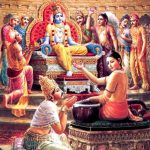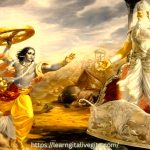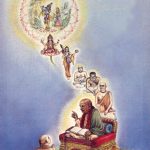In Chapter 1 of the Bhagavad Gita, Arjuna sees his near and dear ones, teachers, and friends on the opposing side of the battlefield, ready to sacrifice their lives in the war. He becomes overwhelmed with grief and compassion, loses his strength, and his mind becomes bewildered; thus, he abandons his resolve to fight. In the second chapter, a Summary of the Bhagavad Gita, Arjuna, as a disciple, takes refuge in Lord Sri Krishna, and Krishna begins his teachings by explaining the distinction between the impermanent physical body and the eternal soul. Lord Sri Krishna describes the process of transmigration, the selfless service of the Supreme Lord, and the qualities of a self-realized person. We will divide this chapter into various sections and analyze the sections in depth.
Table of Contents
2. Arjuna Surrenders to Lord Krishna (BG 1-9)
Arjuna, filled with compassion and grief, hesitates to fight in the battle against his own relatives and teachers. Krishna reminds him that such hesitation is not befitting a warrior who knows the value of life and duty. He encourages Arjuna to rise above this weakness and fulfill his duty as a warrior, as it is the right thing to do. Lord Sri Krishna emphasizes that the soul is eternal and cannot be killed and that by fighting for a righteous cause, one can attain spiritual elevation.
Arjuna expresses his confusion and doubts about the morality of the battle and the consequences of his actions. He questions whether it is better to fight and kill his respected elders or to be killed by them. Krishna explains that one’s duty is determined by one’s nature and that Arjuna’s duty as a warrior is to fight for righteousness without attachment to the results. Arjuna admits his inability to overcome his grief and seeks Krishna’s guidance. He surrenders himself to Krishna as his disciple and asks him to instruct him on the path to spiritual enlightenment
Bg. 2.7
kārpaṇya-doṣopahata-svabhāvaḥ
pṛcchāmi tvāṁ dharma-sammūḍha-cetāḥ
yac chreyaḥ syān niścitaṁ brūhi tan me
śiṣyas te ’haṁ śādhi māṁ tvāṁ prapannam
Translation
Now I am confused about my duty and have lost all composure because of miserly weakness. In this condition, I am asking You to tell me for certain what is best for me. Now I
2. Understanding Soul through Sankhya (Analysis) (BG 10-30)
In the midst of the battlefield, Lord Krishna, with a smile on his face, spoke to Arjuna, who was overcome with grief. Lord Krishna told Arjuna that he was mourning for something that was not worthy of grief, and that wise people do not lament for the living or the dead. Lord Sri Krishna explained that the soul is eternal and that it continuously passes from one body to another.
BG 2.22
vāsāṁsi jīrṇāni yathā vihāya
navāni gṛhṇāti naro ’parāṇi
tathā śarīrāṇi vihāya jīrṇāny
anyāni saṁyāti navāni dehī
Translation
As a person puts on new garments, giving up old ones, the soul similarly accepts new material bodies, giving up the old and useless ones.
Happiness and distress are temporary and must be tolerated without disturbance. Those who are not disturbed by these dualities are eligible for liberation. Lord Sri Krishna also explained that the soul is indestructible and cannot be destroyed by any weapon or element. The temporary body will come to an end, but the soul will continue to exist. Therefore, Arjuna should fight without attachment to the outcome. Lord Sri Krishna further explained that the soul is unbreakable, insoluble, and everlasting. It is present everywhere, unchangeable, immovable, and eternally the same.
Lord Sri Krishna concluded by saying that the soul is amazing and cannot be fully understood by everyone. One who dwells in the body can never be slain, so there is no need for grief. Therefore, Arjuna should perform his duty without attachment by surrendering to Lord Sri Krishna
3. Understanding one’s duty through Sankhya (BG 31-38)
In this third section, Lord Sri Krishna instructs Arjuna, the great warrior, to fulfill his duty as a Kshatriya by fighting on religious principles. Lord Sri Krishna assures Arjuna that such fighting will open the doors of the heavenly planets, making him happy.
Lord Sri Krishna also warns Arjuna that neglecting his duty will bring him sin and loss of reputation. People will speak of his infamy, and dishonor is worse than death for a respectable person. If Arjuna leaves the battlefield, his enemies will scorn his ability, causing him great pain. Lord Sri Krishna advises Arjuna to fight without considering happiness or distress, loss or gain, victory or defeat. By doing so, he will never incur sin. Arjuna should fight with determination, knowing that either he will attain the heavenly planets or conquer and enjoy the earthly kingdom.
4. Buddhi Yoga – Krishna Consciousness (BG 39-53)
In this Section, Lord Sri Krishna explains the path of working without attachment to the fruits of one’s actions, known as Karma Yoga. By performing one’s prescribed duty without attachment to the results, one can become free from the bondage of works and attain transcendence. Lord Sri Krishna emphasizes the importance of being resolute in purpose and focused on the ultimate goal of self-realization. He warns against being too attach to a sense enjoyment
and material opulence, as it can prevent one from developing a resolute determination for devotional service.
The Vedas prescribe various fruitive activities for elevation to heavenly planets and material opulence, but those on the path of Karma Yoga should strive to transcend the three modes of material nature and be establish in the self. Lord Krishna encourages Arjuna to perform his duty without attachment to success or failure and to engage in devotional service to Lord Sri Krishna, which frees one from both good and bad reactions. Through devotional service, one can become free from the cycle of birth and death and attain a state beyond all miseries. When the mind is fix in self-realization, one attains divine consciousness.
Lord Krishna concludes by stating that when one’s intelligence passes out of the dense forest of delusion, one becomes indifferent to all that has been heard and all that is to be heard and attain the ultimate goal of self-realization, Krishna Consciousness.
5. Characteristics of a saintly person (Sthita Prajna) (BG 54-72)
In this Section, Arjuna ask Lord Krishna about the symptoms of one whose consciousness is merged in transcendence. The Supreme Personality of Godhead explained that when a person gives up all desires for sense gratification and finds satisfaction in the self alone, he is in pure transcendental consciousness. Such a person is not affect by happiness or distress and is free from attachment, fear, and anger. He is known as a sage of steady mind.
To attain pure consciousness, one must withdraw their senses from sense objects and fix their consciousness on Lord Sri Krishna. If one contemplates the objects of the senses, attachment and lust develop, followed by anger and delusion. One who is free from attachment and aversion and can control their senses can obtain the complete mercy of the Lord Sri Krishna.
For such a person, the threefold miseries of material existence no longer exist, and their intelligence is well establishing in satisfied consciousness. The person who has given up all desires for a sense of gratification and is free from the sense of proprietorship and false ego can attain real peace. This is the way of spiritual and godly life, and one who is situate in this way, even at the hour of death, can enter into the kingdom of God.
4.Conclusion
The conclusion is given in Bhagavad Gita Verse 2.59 Spiritual Experience is the key
Bg. 2.59
िवषया िविनवत े िनराहार देिहनः ।
रसवज रसोऽ
परं
ा िनवतते ॥ ५९ ॥
viṣayā vinivartante nirāhārasya dehinaḥ
rasa-varjaṁ raso ’py asya paraṁ dṛṣṭvā nivartate
Translation
Though the embodied soul may be restrict from sense enjoyment, the taste for sense objects remains. But, ceasing such engagements by experiencing a higher taste, he is fix in consciousness. One who can control their senses and mind, and fix their consciousness on the Supreme Lord Sri Krishna, is establish in transcendental knowledge and free from material bondage.




